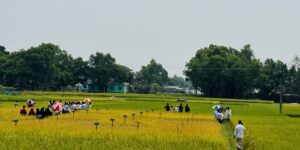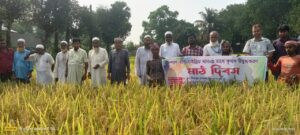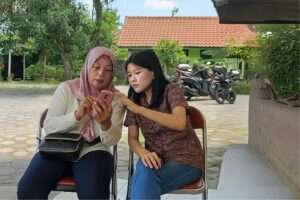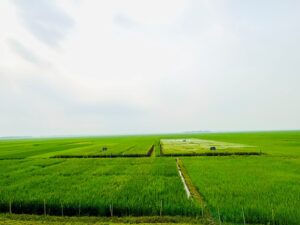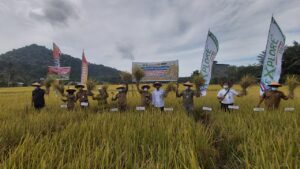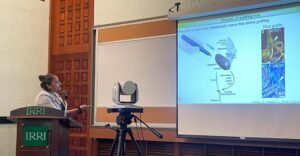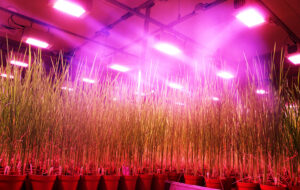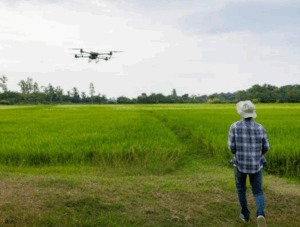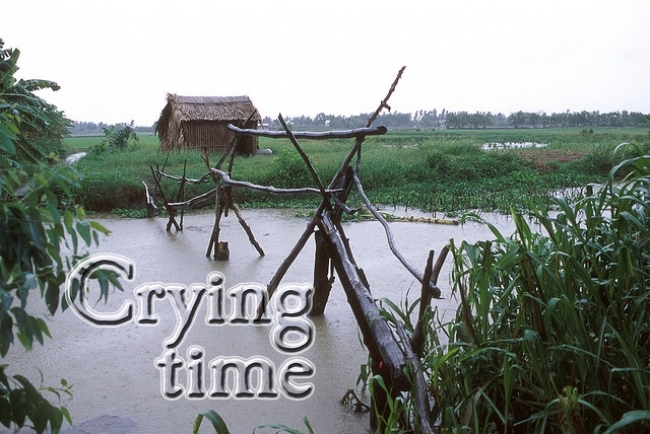
When they come calling in a village, Truong Thi Ngoc Chi and Tran Thi Ngoc Mai bring the refreshments. They do this because the poor rice-farming women who receive them would be hard pressed to offer nuts and rice cakes to nibble on while sharing information, tea and sympathy. Chi, an associate scientist at the Cuu Long Delta Rice Research Institute, and Mai, a researcher at the same Mekong Delta-based institute, are researching how Vietnamese women cope with the demands of rice farming when their husbands migrate away to earn extra income.
“We’re looking at how farm families are bearing up as modern forces restructure rural economies across Asia and redefine the place of rural people in national societies,” explains Thelma Paris, a gender specialist in the Social Sciences Division of the International Rice Research Institute (IRRI), who coordinates the research in southern Vietnam with parallel work in Thailand, Philippines, Indonesia and India.
“The results have implications for formulating policies to manage change in a way that broadly maintains and improves social welfare. And the research should provide early warning if rapid change in the countryside is undermining the national and regional food security that we’ve worked so hard over the past several decades to achieve.”
Results to date show that the women left behind generally cope well with their expanded roles. They certainly welcome the opportunity to tell social scientists about their successes and failures, their abiding hopes and loneliest fears. But gaps still open up in conversation, potentially awkward moments that the refreshments help to fill.
“The women,” Chi observes, “often cry.”
The southern Vietnamese hamlet of Gia Tieu consists largely of thatch huts with floors of packed earth. A sun-scorched, rutted track along an irrigation canal provides two-wheeled access from the road a couple of kilometers away. The tiny rice farms of Gia Tieu, typically measuring 1 ha or less, are poverty traps despite irrigation. Small wonder that many residents here, especially men, seek off-farm employment.
It is an old story that workers throughout the developing world migrate to find jobs in cities and remit earnings to relatives back home. This study found, however, that more than two-thirds of the migrants from families in the study area in Bac Lieu Province, one of the poorest in the Mekong Delta, work not in cities but in other rural districts, mostly in agriculture but also in construction. More than a third of the women receive no remittances because their husbands can barely support themselves on the US$1-2 they earn for a day’s work. Others fare somewhat better, and remittances typically account for a quarter of the income of farm families with migrants, bringing their average per capita annual income to $190. This is higher than the $145 figure for farm families without migrants, but still below the Bac Lieu per capita gross domestic product of $296.
In short, migrant families start out poor and usually stay that way. Nearly half of the women left behind cite their children’s education as the only real benefit of migration. Almost as many say they gain nothing. Some report that their neighbors’ belief that they are better off actually makes getting loans more difficult.
Despite everything, women generally manage to maintain the productivity of their rice fields, albeit at the cost of considerable effort and anxiety. Pest control is especially challenging, as women’s traditional inexperience in identifying pests and the appropriate pesticide to use is compounded by the difficulty of carrying a bulky backpack sprayer.They hire help for this and other heavy work such as preparing land, applying fertilizer and hauling sacks of grain — often going into debt to do so.
“Still, they feel vulnerable to theft and violence,” says Chi. “Many can’t manage water as efficiently as they should because they’re afraid to go out to their fields alone at night.”
__________________________________________
Mr. Frendenburg is a communications expert from IRRI


